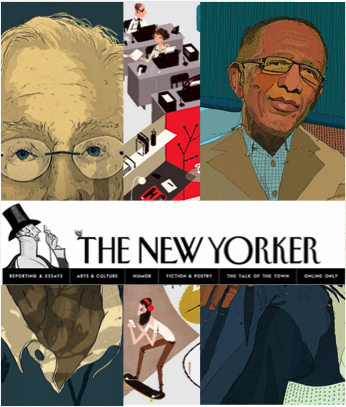
We sociologists tend to have a chip on our shoulder. We tend to think—not without substantial evidence, of course—that our research and ideas are not particularly visible or influential in the public realm, both in general and especially in comparison to our social science cousins. Maybe we should all be reading The New Yorker. It seems like we’ve got a few champions over there.
Exhibit A: A few weeks back, for example, the magazine ran an intriguing and insightful profile of Howie Becker. This was not a fluff piece. Inspired by Becker’s current popularity among a certain set of French sociologists in Paris (where the 86-year-old Becker now spends a great deal of his time), Adam Gopnik’s* article thoughtfully walks readers through Becker’s intellectual career and distinctive way of thinking about deviance, culture, and collective activity. This wonderfully written piece serves, I think, not only to introduce a broad, general audience of readers to one of the truly iconic (and iconoclastic) figures in sociology and his uniquely sociological worldview. More than this, it frames and situates Becker’s work in the broader history and current debates of the field in a subtle, sophisticated way that I believe proves provocative and edifying no matter how much we may already know and think about the discipline and Becker’s contributions to it. (For you insiders: Becker directs a zinger or two at Pierre Bourdieu along the way.)
Exhibit B: Last May, a review of recent books on office design by Jill Lepore was framed around a discussion of C. Wright Mills’s classic 1951 study White Collar. Although ostensibly about new studies of the new trends in office work, this review, at least in my reading, seems more fascinated with and driven by what Mills and his sociological perspective contribute to our understanding of life and work and contemporary work culture than anything written recently from more specialized scholars and fields.
Exhibit C: The latest example comes in this week’s issue, which carries a review of Orlando Patterson’s new edited volume (with Ethan Fosse, Harvard University Press) on race and culture by Kelefa Sanneh. (Special thanks to TSP board member Jack Delehanty for calling my attention to it, even before my copy of the magazine arrived in the mail. Yes, I still read the magazine the old-fashioned way.) It’s a typically well-written piece that lays out a hot sociological debate in language that is accessible to a wide range of people and without pulling any punches.
Sanneh starts by laying out how structuralists (a term he uses to describe the vast majority of sociologists who generally explain the problems of black poverty and inequality in terms of institutional discrimination and systemic racism) and culturalists (who, like Patterson, see merit in the idea that elements of black culture play a significant role in the perpetuation of racial disparities today) might understand the events of Ferguson and Staten Island differently. Sanneh then explains many problems with the culturalist approach, drawing on lots of other sociologists to bring in evidence of the structural problems that underlie the culturalists’ claims, and then nailing them with this uppercut: “Among Patterson, Fosse, and their peers, the tendency to write as if black culture were in exceptional crisis seems to be what a sociologist might call an unexamined injunctive norm: a shared prescriptive rule, one so ingrained that even its followers don’t realize it exists.” Whatever you may think of Patterson and his colleagues and whether you work in this area or not, this is serious sociology, deeply knowledgable about essential, ongoing debates in the field and how these matter for the most pressing, public issues of the day.I don’t know who exactly is responsible for this attention, specifically if someone or groups of someones in our discipline is in the ear of the New Yorker editorial staff or what. (I’ve got my suspicions.) But I love the love for sociology.
Let me close with one of my favorite such pieces. It was published two years back in January of 2013 on the topic “how cities can be ‘climate-proofed’.” This piece didn’t actually have as much explicit sociology in it as some of those I’ve referenced above. But it was written by a sociologist. NYU’s Eric Klinenberg was called upon not just to review the sociological research contributions on the topic, but also—and more importantly— to provide a broad, cross-disciplinary synthesis and assessment of what is known about climate change and urban design, and then to draw out the implications and applications for future design and policy. That, in my view, was and is sociological thought at its biggest, broadest, and finest. It is what we sociologists—with our big theoretical visions, our critical thinking, our empirical grounding, and our technical skills—are uniquely positioned to offer to public policy and public debate. Keep it coming, The New Yorker, keep it coming.
_____
*Our associate editor, Letta Page, is convinced that Gopnik writes the best concluding sentences in the business. His book Angels and Ages makes her list of books social scientists should read to improve their own writing.

Comments 1
The New Yorker: Champion of Serious Sociology - Treat Them Better — February 12, 2015
[…] The New Yorker: Champion of Serious Sociology […]